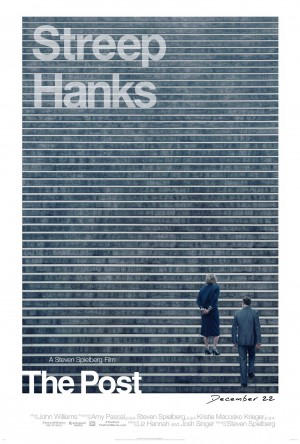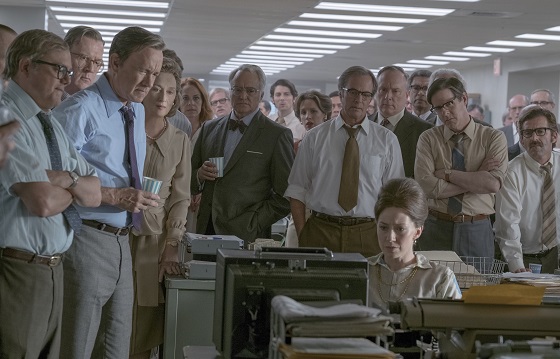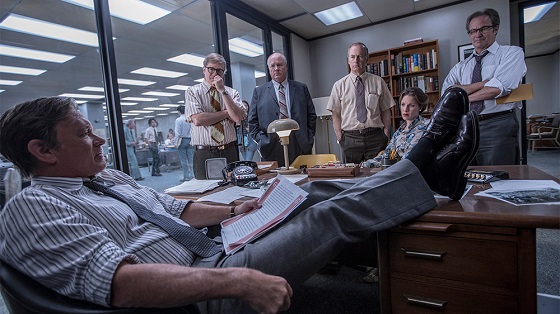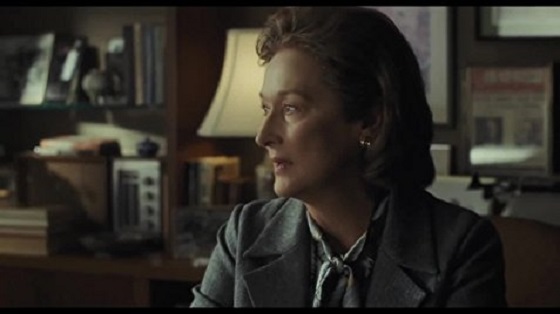
 Okay so before we go anywhere else I feel I need to open with a disclaimer:
Okay so before we go anywhere else I feel I need to open with a disclaimer:
Steven Spielberg’s The Post is not a bad film, nor is it made by a bad filmmaker. It’s decently shot, well edited, well performed. Its script has snappy, engaging dialogue and the score is… fine? John Williams is on autopilot here, but it’s still John Williams; it’s not awful. It is fine and most people just looking for a Spielberg historical drama will get exactly what they want. Anyone who liked Bridge of Spies a lot and is just searching a fun but not particularly challenging drama, sure.
[Rating: Minor Rock Fist Up] … I guess. Go see it if you want. I don’t care.
HOWEVER.
For my money The Post is the biggest waste of potential of the year and the new ultimate signifier of how much Spielberg has fallen as an artist. Never before has it been so obvious that his teeth have just dulled. This film makes Ken Burns seem edgy and political, and this is the EXACT WRONG MOMENT TO BE DOING THAT.
Allow me to explain.
Also disclaimer two: I’m going to get … political.
Our current president is a moronic dullard surrounded by a vast selection of yes-men that rival the Russian Mob in their lack of morals and insularity of secrets. They are bad men and it is the job of the press to do everything they can to find the dirt on all of them as an open and honest government is key to a functioning democracy. This same group has had an active distain for the press and has worked tirelessly to discredit the entirety of the American political press and create a new, state-sanctioned alternative press worthy of the Soviet Union.
The Post, set in 1971 during the publication of the Pentagon Papers, a collection of documents discussing U.S. involvement in Vietnam dating back to the 1940s, incriminating every president during that time in shady dealing and cover-ups leading to the escalation of the war. All of them were responsible for Vietnam, even JFK, and the American people had a right to know where their children were being sent and why. The press was actively surprised, and it was only via the bravery and integrity of said reporters that we did not lose out on discovering decades of secrets that led to one of the most pointless and destructive of modern military conflicts.
Now, is it just me, or does that sound like a rather relevant story? The press getting its crap together after years of fluff pieces to do bold, dangerous reporting and holding government accountable for its actions? Shame the film itself didn’t seem to come to the same conclusion.
There is a concept I like to call the Spielberg 20. It is the 20 minutes in which Spielberg takes all of the interesting, subversive and difficult concepts his films explore and bleaches them to make a palatable, simple film you can watch with your grandparents. This is often the last 10-20 minutes of near every film he makes. In Saving Private Ryan, it is the infamous bookends where the otherwise deeply cynical and pessimistic film about how much is sacrificed in war even if it is nominally in the name of good is turned into a warm pat on the shoulder of veterans saying yes, your life was more important than those who died to keep you alive. In Lincoln, it is the passing of Lincoln down a hallway into history, making an icon and hero out of the man we just spent near three hours watching using underhanded tactics and an enormous wit to achieve good despite his own crippling depression and willingness to engage in corruption. In The Post, it begins with Meryl Streep delivering a monologue about how much she loves her paper and the ensuing 20 minutes depicting how great it was that The Washington Post got to stay afloat. I mean, yay right? Our heroes didn’t lose their paper! Because of all things THAT should be the priority of this film.
And then it leaves us with a “just wait till next week’s thrilling adventure!” stinger cliffhanger, next week’s adventure of course being goddamn Watergate.
Brazilian dramatist Augusto Boal is vital to the history of modern theater for his coining of the term and development of the philosophy behind the “Theater of the Oppressed,” or theater developed as a style determined to spark and result in real change in the culture it is discussing. Quoted as saying “The Theater itself is not a revolution, it is a rehearsal for the revolution,” he developed the theoretical backing for The Theater of the Oppressed as a method of wanting to spark real, tangible action on the part of the audience. I could go far deeper — he draws a lot from Marx in terms of unconscious class struggles and from Brecht in the subconscious distance from the stage, but really if you’re interested you should just read some of his work and track down some of his interviews.
Instead I will bring up one parallel concept of his, that of “finished theater” or “bourgeois theater.” Finished theater often involved a revolution or struggle of some sort, depicting class struggle and great challenges to its characters. It also paints said struggles as fairly one-sided and simple. Lin-Manuel Miranda’s Hamilton (a musical I do adore don’t get me wrong) is a marvelous example of this, being a dramatic narrative of an underdog protagonist fighting for his place in a society as well as an actual revolution against an oppressive governing force. It does this by using hip-hop, a genre historically rooted in social commentary and providing a voice for the underprivileged. This said though it is ultimately very supportive of the American Experiment and does very little that would question the beliefs of the wealthy American audience. Mike Pence went.
The Post is the very epitome of finished cinema. It paints itself as a revolutionary text but ultimately portrays the struggles of its protagonists as thoroughly in the past and relevant to today only in the necessity of us to repeat these acts. We are in no way forced to deal with the implicit nature of many of the protagonists’ relationships to the power structures in place or their role in creating the situation we are in now. We are not needed at all to face the inevitability on our own parts to partake in holding said structures available as well, for the film shows this as the job of the reporters, and never that of a discerning audience. We aren’t ever made uncomfortable or called to action or forced to deal with any larger issues other than “Isn’t it nice that the bad man didn’t kill the newspaper?”
The Post is not a bad film. Just a cowardly one. Never has Spielberg’s fear of dividing audiences been more detrimental or more insulting. By all means go see it, but please dear God don’t act like seeing it is a political statement. This is no firebrand piece of art about taking on the man, this is a reassuring hug about newspapers that you can show kids in a classroom. It’s fine but pointless, dull and, for those of us desperately waiting for any sign that Hollywood is actually aware of how much change needs to happen in this country, a massive disappointment.








Comments on this entry are closed.